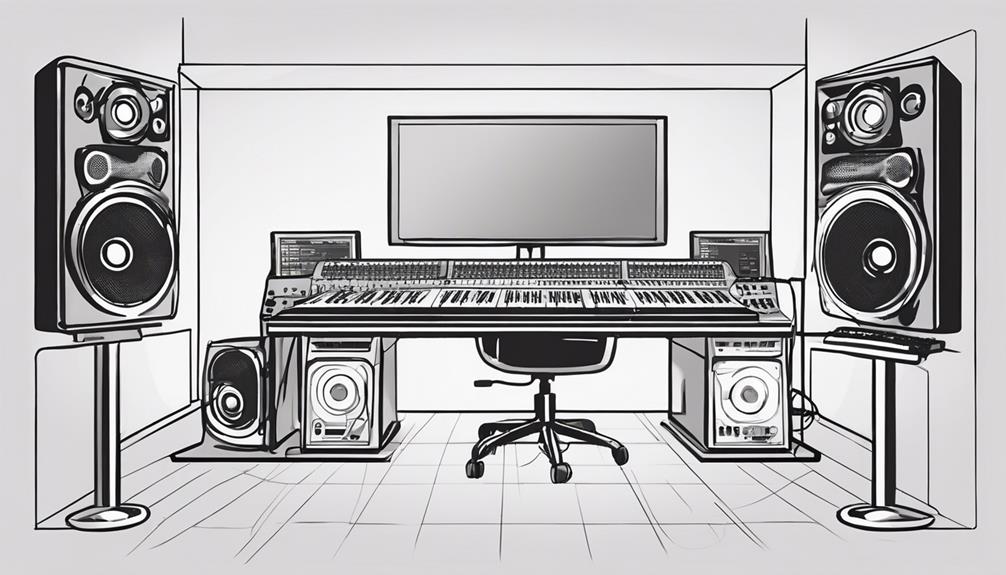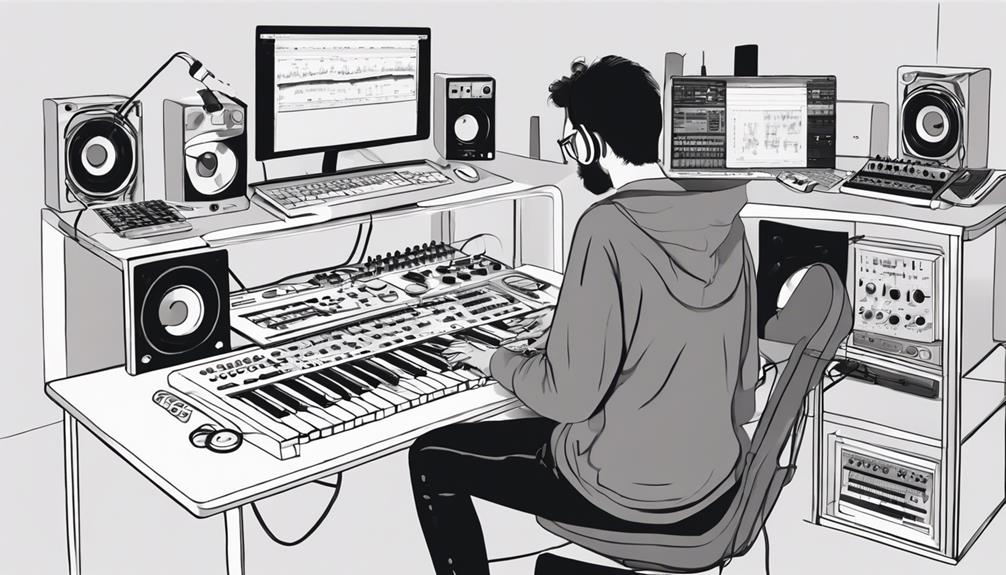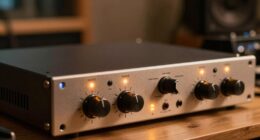To start your own music production company, begin with thorough market research to understand consumer preferences and competition. Plan your budget wisely, considering personal savings, loans, or crowdfunding. Select a music genre that aligns with your passion and market demand. Choose a suitable business structure for tax implications. Obtain necessary licenses and permits to stay compliant. Equip your studio with essential recording gear and create a conducive recording environment. Each step is essential for a successful music production company. Build a strong network by collaborating with local artists and industry professionals to promote your brand and gain clientele. Invest in marketing strategies, both online and offline, to increase visibility and establish your presence in the competitive music industry. Learning how to start a music production company also involves staying updated with the latest technology and trends to remain innovative and appealing to your audience.
Key Takeaways
- Conduct market research to understand demand and competition.
- Determine funding options and create a financial plan.
- Choose a suitable business structure for tax and liability purposes.
- Obtain necessary licenses, permits, and comply with regulations.
- Invest in essential recording equipment and set up a studio space.
Market Research
Conducting thorough market research is essential when starting a music production company. To kickstart your venture successfully, explore consumer spending habits, decipher target market preferences, and decode the competitive landscape. By conducting surveys and focus groups, you can gain valuable insights into what your audience desires in the music production domain.
Analyzing consumer spending habits will enable you to tailor your marketing strategies effectively, ensuring maximum impact. Utilize observation techniques to understand the nuanced needs and wants of your target market, allowing you to fine-tune your offerings accordingly.
Armed with this market research, develop tailored marketing strategies that resonate with your audience, setting you apart from competitors. By utilizing the findings to create a competitive edge, you can position your music production company for success in a saturated market.
Start-Up Capital

You need to take into account various funding options, budget planning, and financial projections when discussing start-up capital for your music production company.
Understanding how to secure funds through personal savings, loans, investments, or crowdfunding is essential.
Proper allocation and management of your start-up capital will determine the success and sustainability of your business.
Funding Options
When starting a music production company, exploring various funding options is essential to secure the necessary start-up capital for your venture. Music production companies require start-up capital that can vary greatly, depending on factors such as equipment, studio space, and the scale of the business.
Common sources of start-up capital for music production ventures include personal savings, loans, investors, and venture capitalists. Proper allocation and management of this capital are vital for the success and sustainability of your music production company.
Understanding the specific financial needs of your business will help you determine the amount of start-up capital required. Researching and comparing different funding options will enable you to make informed decisions about securing the necessary funds for your music production company.
Budget Planning
To effectively launch your music production company, start by determining the required start-up capital for equipment, studio space, licensing, and marketing expenses.
Research various funding sources like personal savings, loans, grants, or venture capitalists to secure the necessary start-up capital.
Create a detailed budget plan that outlines all financial requirements and projected expenses for your music production venture. When developing your budget, remember to take into account ongoing operational costs such as utilities, software subscriptions, and potential employee salaries.
Allocate your funds strategically to guarantee a smooth launch and sustained growth of your music production company. By carefully planning your budget and accurately estimating your financial needs, you can set a strong foundation for your business's success.
Be proactive in managing your start-up capital to navigate the initial stages of your music production company effectively.
Financial Projections
Estimate the total start-up capital required for your music production company, encompassing equipment costs, licensing fees, and operational expenses. To ensure financial sustainability, it is crucial to calculate monthly expenses and revenue projections to determine the break-even point. This analysis allows you to understand when your company will start generating profit. Secure funding from sources like personal savings, loans, or investors based on these financial projections. Creating a detailed budget outlining the allocation of funds for different aspects of your music production company will help you stay on track. Regularly monitoring and adjusting your financial projections is essential to adapt to any changes in the market and ensure the long-term success of your business.
| Expense Type | Estimated Cost | Percentage of Start-Up Capital |
|---|---|---|
| Equipment Costs | $20,000 | 40% |
| Licensing Fees | $5,000 | 10% |
| Operational Expenses | $25,000 | 50% |
Music Genre Selection

Consider your passion and expertise when choosing a music genre for your production company. To make an informed decision, keep in mind the market demand, audience appeal, and emerging music genres. Here's how to approach music genre selection:
- Passion and Expertise:
Start by evaluating your personal interests and skills. Select a music genre that resonates with you and where you can showcase your strengths in production.
- Market Demand and Audience Appeal:
Research the current trends and demands in the music industry. Choose a genre that not only aligns with your passion but also has a significant audience following to guarantee your company's success.
- Target Audience and Emerging Genres:
Understand the demographics of your target audience to tailor your music production accordingly. Additionally, stay updated on emerging music genres to diversify your offerings and attract a broader range of listeners. By staying in tune with market demands and audience preferences, you can position your production company for long-term growth and success.
Business Structure

When starting your music production company, you'll need to think about the right business structure for your needs. The type of entity you choose will impact how you're taxed and your legal responsibilities.
Consider the pros and cons of each structure to make sure it aligns with your company's future plans.
Legal Entity Formation
Select a suitable business structure, such as a sole proprietorship, partnership, or corporation, for your music production company based on your specific business needs and future goals. Each type of business entity comes with its own set of advantages and disadvantages, impacting taxation, liability, and compliance requirements.
Consider the following when deciding on the legal structure for your music production company:
- Sole Proprietorship:
- *Advantages:* Simple to set up, complete control over decision-making.
- *Disadvantages:* Unlimited personal liability, challenging to raise capital.
- *Taxation:* Pass-through taxation, profits taxed as personal income.
- Partnership:
- *Advantages:* Shared decision-making, potential for diversified skills.
- *Disadvantages:* Shared profits and liabilities, interpersonal conflicts.
- *Taxation:* Pass-through taxation, profits divided among partners.
- Corporation:
- *Advantages:* Limited liability protection, easier access to capital.
- *Disadvantages:* Complex setup and maintenance, double taxation.
- *Taxation:* Corporate tax on profits, dividends taxed at individual level.
Tax Considerations
Tax implications vary considerably depending on the business structure chosen for your music production company, such as sole proprietorship, partnership, or corporation.
In a sole proprietorship, your business income is reported on your personal tax return, simplifying the process.
Partnerships, on the other hand, pass profits to partners who report them on their individual tax returns.
Corporations face double taxation, where the business is taxed on its profits, and shareholders are taxed on dividends received.
Understanding these distinctions is essential as it can greatly impact your tax obligations and bottom line.
Consulting with a tax professional is advisable to determine the most tax-efficient structure for your music production company. They can provide tailored advice based on your specific circumstances, helping you navigate the complexities of tax laws and regulations.
Licenses and Permits

To legally operate your music production company, you must first obtain a commercial music production license from the Copyright Office. This license is vital for ensuring that you have the necessary legal permissions to produce music for commercial purposes.
Additionally, it's advisable to take into account the following:
- Secure a business license from state and local governments: Obtaining a business license is essential for the legal operation of your music production company. This license demonstrates that your business is compliant with local regulations and is recognized as a legitimate entity.
- Ensure you have all necessary permits for music production operations: Different locations may have specific permits required for music production activities. Make sure to research and obtain any required permits to avoid legal issues and disruptions to your business operations.
- Stay updated on licensing regulations: It's vital to stay informed about any changes in licensing regulations to maintain compliance. Failing to adhere to licensing requirements can lead to penalties and affect the reputation of your music production company.
Equipment and Recording Setup

In order to guarantee that your music production company can deliver high-quality recordings, you must equip your studio with essential gear and set up the recording space adequately. Invest in quality studio monitors, headphones, a microphone, and an audio interface to ensure professional recording capabilities.
Additionally, acquire the necessary equipment for recording instruments such as guitars, keyboards, and drums to enhance your production capabilities further.
Setting up acoustic treatment in your recording space is important to improve sound quality and reduce unwanted noise interference. Make sure that your home recording studio is located in a quiet, soundproof area of your house to minimize external disturbances that could affect the recording process negatively.
While aiming for high-quality standards, consider budget-friendly options available for basic recording equipment. By balancing cost-efficiency with quality, you can create a well-equipped and functional recording setup that meets the needs of your music production company.
Frequently Asked Questions
Do Music Producers Need an Llc?
You should consider forming an LLC as a music producer. It provides legal protection for your personal assets, separates finances, offers management flexibility, and minimizes liability. Establishing an LLC can help legitimize your operations and safeguard your business interests.
How Much Does It Cost to Have a Music Production Company?
Starting a music production company can cost between $10,000 to $50,000. Expenses include equipment, studio space, licensing, staff, permits, and ongoing costs like utilities and marketing. Budget for insurance, legal fees, and development for sustainability.
What Type of Business Is a Music Production Company?
A music production company is a creative powerhouse in the industry. It collaborates with artists, bands, and labels to produce high-quality music. Embrace the journey of crafting sounds that inspire and move listeners.
How Profitable Is Music Production?
Music production can be highly profitable with the right approach. By marketing well, networking effectively, and delivering quality productions, you can generate revenue from various sources like producing music for artists, film, TV, commercials, and video games.
Conclusion
Now that you've laid the groundwork for your music production company, it's time to let your creativity soar like a symphony in full bloom.
With the right mix of passion, dedication, and business acumen, you're ready to hit the right notes and make your mark in the industry.
So grab your headphones, tune into your vision, and watch as your dreams harmonize into reality.
The stage is set, now go out there and make some music magic!










